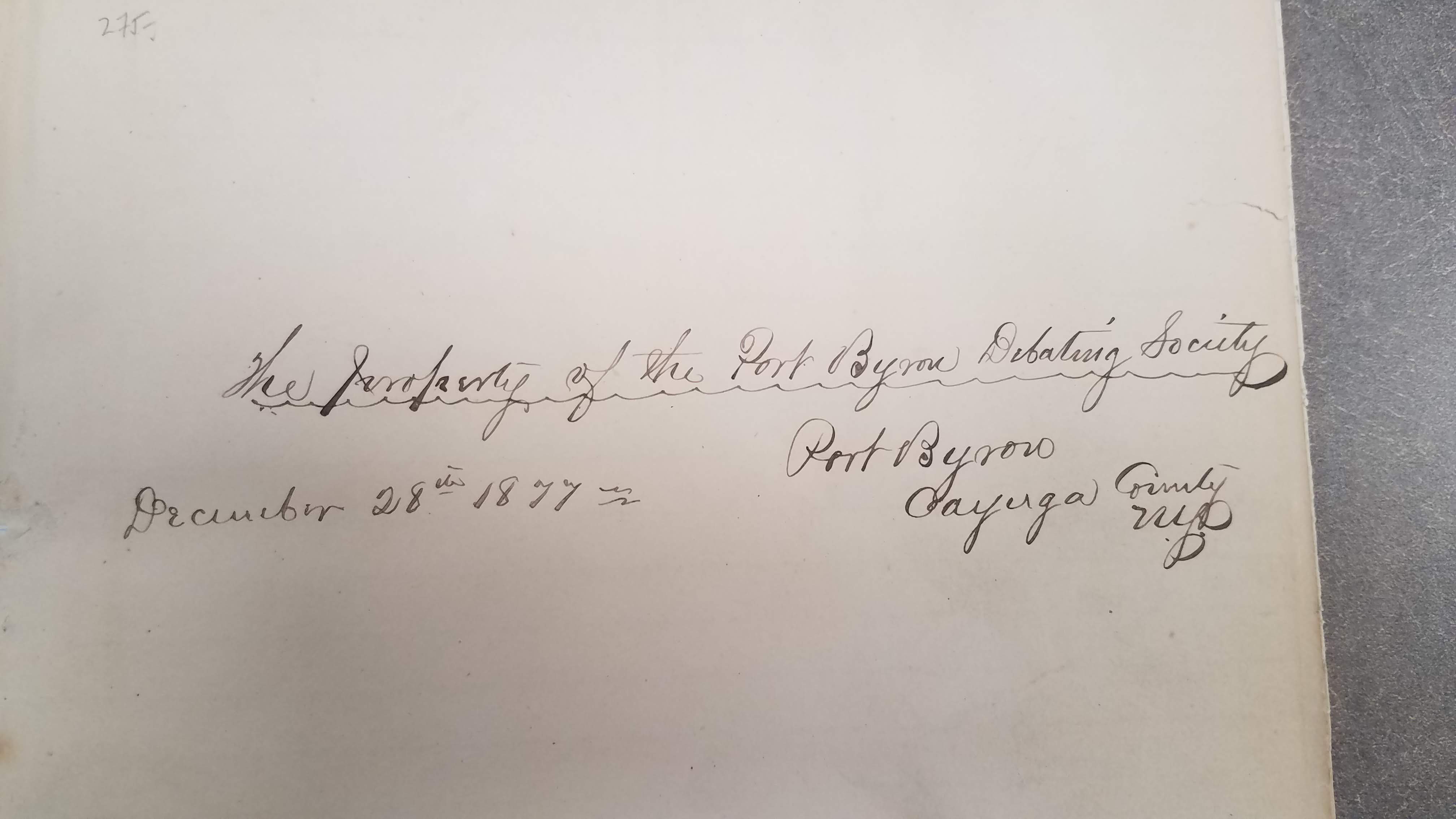On the first weekend of January, my wife and I took a day trip to Albany. It is always a pleasant trip, and it gives me a chance to see the old home region. However, the purpose of the trip was to follow up on some research in the New York State archives, and my wife wished to see the state museum. Both are in the same building right in downtown Albany. Since it was the weekend, traffic is much lighter and finding parking is much easier as the state workforce is home. Although the purpose of my visit was to carry on some canal study, my host wished to show me a couple of the Port Byron items that the archives and the State Library have in their collections.
The first item was a record of minutes and debates from the Port Byron Debating Society. The Society was organized in 1870 and among it’s members were some of the more prominent men of the village. This journal was dated 1875 and the list of members included John Barrus, Volney Burk, Martin Bunn, Samuel Dougherty, William Root, Edward Taylor, Charles Wilson, Edwin Slayton and more. The debating “season” was in the fall and winter and they often traveled to nearby villages to engage with other dating societies. In addition to debates, the Society also held lectures. The topic to be debated was proposed the month prior and then the men, as teams, would either make an argument in favor or opposed. Once both sides had made their argument, the critic or referee would decide which side had “won” the night. In 1875, the group debated Governor Tilden’s canal reform measures, in which the pro governor group successfully won. On the night of October 12, 1877, the group debated whether the bankruptcy law should be abolished, and then decided that for the November meeting, the question of the night would be “that the free moral agency of man can be harmonized with the absolute sovereignty of God” That debate must have been wonderful to see. In February 1882, the Weedsport and Port Byron societies met in Weedsport to debate the question of woman’s suffrage, which all the women of the world will be happy to hear that Port Byron won the night in favor of the women’s right to vote. But not to be outdone, it was decided that Weedsport would travel to Port Byron to debate whether voting should be restricted to men over 21 who could read and write. Not all the debates were of such a serious nature. In 1888, the group debated whether the Italian race of honeybees were superior to all others. It’s is a fascinating look into the lives of those who lived in the village. The topics were surprisingly diverse, and just goes to show how aware the people of Cayuga County were to what was taking place around the state and world.

Another document was a account book from 1840 to 1865 that belonged to a Harnden, maybe Samuel, but I have yet to pin that down. These account books list the various folks that the store sold to on credit along with a list of items and prices. Although no where near as interesting as the minutes of the debating society, these books do give a small peek into the lives of those who lived here back in the 1800’s. For instance, while the State repair scow purchased supplies to keep their horses, James Milliner purchased nuts, oranges, raisins, lemons, and Richard King purchased codfish and tobacco. For those going through their family genealogy, little details such as these help to round out the lives of these grandparents. I believe that the Port Byron library has one or two, as does the historical society.
The best thing about the State library and archives is that they are free to use, and you can take your camera (no stand or lights allowed, but most phones with good cameras work fine). I don’t even bother taking notes. Instead, take a thousand photos and read it all at home. Call or email ahead of time to plan out what you want to see, always ask for more than you think you will wish to see, and ask that the materials be pulled prior to your arrival. If you don’t, you will waste valuable time waiting for the next materials pull. Don’t take pens or bags. You are allowed a pencil, paper, and camera. Be prepared to be fascinated.
